When political humour lands in troubled waters

Political humour, in the form of satires and parody, in writing, cartoons and network shows, has existed since politics itself but has also historically received a lot of pushback. The craft of using humour, exaggerations and irony to lampoon and criticise cultural mores, public figures, governance, etc functions as a fabled bellwether for positive change. It has always been a tricky form of journalism and activism for obvious reasons: it pokes the powerful. The "job" of the craft is to discomfit the powers that be, but it has landed in troubled waters – in legal cases all over the world – when it has done the job and rubbed the powerful the wrong way. But every time political humour comes under attack, so does the framework of freedom of speech and the distinct sensitivities of who can mock what.
The US is a good case study to understand the legal rights of humour in public discourse. A landmark decision 60 years ago set the precedent to protect satires and parodies as free speech. The Supreme Court of the United States passed a landmark ruling in 1964, New York Times vs Sullivan, which deterred the powerful from using defamation lawsuits to intimidate and silence public discourse. The ruling essentially upheld that the First Amendment – freedom of speech – is more important than replenishing the reputation of public figures, and that "debate on public issues should be inhibited, robust, and wide-open."
In 1988, another landmark case, Hustler Magazine vs Falwell, the court evoked the Sullivan decision and sided with the magazine that published a parody advertisement portraying a nationally known minister. The court upheld that parodies of public figures, even those intending to cause emotional distress, are protected by the First Amendment.
Recently, the Sullivan decision received numerous bids for overruling as bids for silencing non-Republican commentary rose in the US. Former President Donald Trump – who did not attend his goodbye dinner where media elites and comedians roast the president and is yet to admit he lost a fair election – publicly attacked the Sullivan decision and sued CNN for defamation seeking $475 million. As recent as February 2023, Florida state legislator Alex Andrade filed a bill to effectively overturn Sullivan. The Republican politicians who have been against the legal protection of political jokes are, unsurprisingly, ones who have supported various conservative decisions in the US.
Logically, more often than not, it is corrupt governments and authoritarian nations who have issues with political humour, because they don't want to be called out; they want to dictate without some wisecrack nudging their official authority. The relationship between authoritarianism and political satirists and comedians have a lengthy history of incompatibility.
Humour is necessary for the political arena itself. It builds resilience through absurdity; it takes a sense of security and comfort in our skin to accept reality checks ensconced in leg-pull without taking offence. We don't always like it when people make fun of what we do or how we are. And that's fair and human. But as public figures, and even as journalists, when you do your work for the public, you sign up for public criticism, for a quip and a roast now and then.
Take Vladimir Putin, for example, who banned the makers of South Park figurines, Lego characters and teddy bears which were the centre of the toys-only, humour-driven anti-Putin protest in Siberia. After that, Putin imposed a ban on toy protests. And even in 2021, Idrak Mirzalizade, a Moscow-based Azerbaijani comedian, was sent to prison for 10 days and banned from Russia for life after pro-government media outlets distorted the harmless joke he made about discrimination against non-Russians – during his appearance on popular TV show Razgony – to one that incites hatred.
Another recent and popular example is Hasan Minhaj's Saudi Arabia episode on his show Patriot Act in 2019, where he mocked Prince Mohammed bin Salman's effort to cast himself as a moderniser, and called him out for the murder of the columnist Jamal Khashoggi and the Saudi bombing campaign in Yemen. Saudi Arabia, where comedians and journalists face pervasive censorship, invoked a vague cybercrime law to request Netflix to take the episode down. (And Netflix did, in a scrutinised market decision, that legitimised Saudi's censorship.)
The point is, of course, Saudi Arabia had a problem with Minhaj's episode. Comedy is no laughing matter for repressive regimes. Arab countries have laws that criminalise offences to heads of state, the army, public institutions, for disavowing national and religious values. In these nations, journalists and entertainers, when taking a jab at the powerful, have historically been punished for broad crimes like tarnishing the country's reputation, offending public morals, inciting unrest or shaking the foundations of national security. In Egypt, widely popular comedian Bassem Youssef – inspired by Jon Stewart – was harassed, taken to court for mocking the Islamist President Mohamed Morsi, and is now in exile.
More examples are being painted now, with authoritarian governments on the rise; journalists and comedians in Turkey, India and so on have recently faced lawsuits. Even Rahul Gandhi, the vocal opposition leader in India, was hit with a harsh sentence in a defamation case for a joke he made years ago. Yet, the whole point of political humour is to prick where it hits, to make us laugh at our own foibles and weaknesses. In journalistic practices, when directed at individuals in power, satire's purpose constitutes the very yardstick of journalism: to make the afflicted comfortable and the comfortable afflicted.
And historically, humour as a political tool has worked to electrify anti-state public sentiments, which perhaps is all the more reason for authoritarian governments to attack it. In Syria, during the civil war that has taken 70,000 lives, satirical graffiti mocking President Bashar Assad exhilarated street protests. Even in the 1940s, underground humour inspired resistance movements in Nazi-occupied territories. In today's age, there's a reason why there's a well-researched phenomena called the "Daily Show effect." People, particularly young people, take more interest in politics when it comes with a punch, rather than straight-faced journalism. And that is why political jokes pose the most formidable threat to those who don't want their power shaken, their public duties questioned.
But humour is necessary for the political arena itself. It builds resilience through absurdity; it takes a sense of security and comfort in our skin to accept reality checks ensconced in leg-pull without taking offence. We don't always like it when people make fun of what we do or how we are. And that's fair and human. But as public figures, and even as journalists, when you do your work for the public, you sign up for public criticism, for a quip and a roast now and then. When we can endure the targeted humour – even the pettiest of jokes – it signals a more ethereal power, reverberating the hush of dignity and establishing our thick skin as individuals and as a society.
Ramisa Rob is a journalist at The Daily Star.

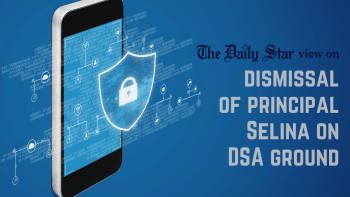
 For all latest news, follow The Daily Star's Google News channel.
For all latest news, follow The Daily Star's Google News channel. 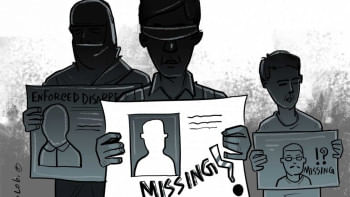
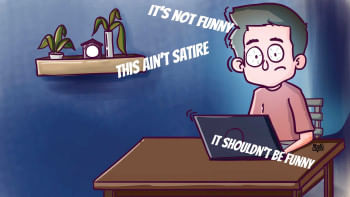



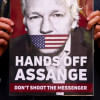





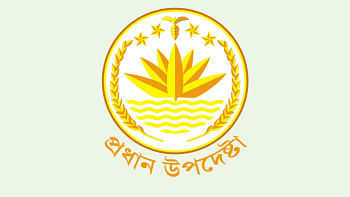
Comments